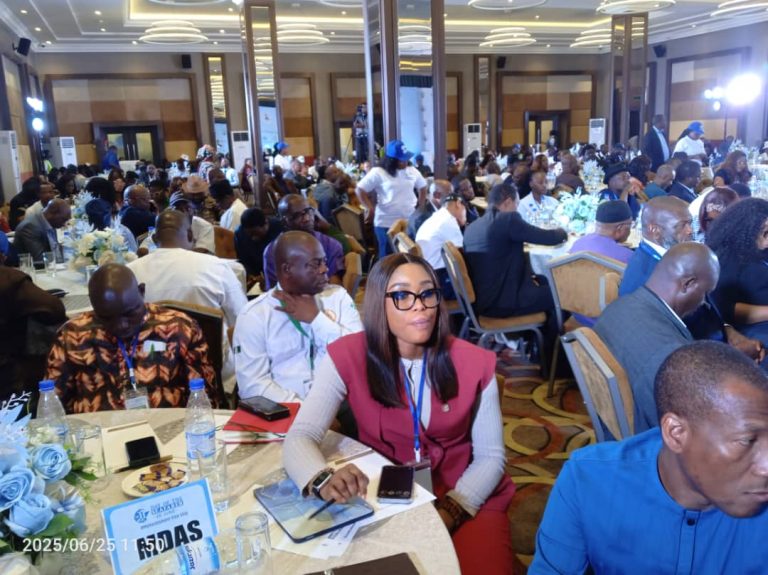Adeboyega Oyetola, Nigeria’s Minister of Maritime and Blue Economy, has unveiled in Port Harcourt, Nigeria’s e-platform, a portal expected to help Nigeria achieve global maritime competitiveness and international trade.
The electronic portal (platform) was built by the Nigerian Maritime Administration and Safety Agency (NIMASA) to create an integrated digital centre to fast-forward regulatory functions and hasten inspection in transparent ways.
Unveiling the platform in Port Harcourt at the International Seafarers Day celebration under the International Maritime Organisation (IMO), the Minister said the theme, “My Harassment-Free Ship,” speaks to Nigeria’s collective duty to make every ship a safe and respectful workplace, saying harassment and bullying have no place in the nation’s maritime industry.
The minister stated thus: “We are building digital platforms to connect seafarers with support networks and job opportunities worldwide, while advocating for improved working conditions through bilateral maritime agreements. The Ministry is also actively supporting Nigerian participation in international shipping to increase sea-time opportunities for cadets and professionals.

“We are also advancing the welfare and rights of Nigerian seafarers. The recent Collective Bargaining Agreement, facilitated by NIMASA alongside industry unions and employers, sets a new benchmark for fair wages, decent working conditions, and improved dispute resolution.”
Read also: How Adegboyega Oyetola is transforming Nigeria’s Marine and Blue Economy
The Federal Government of Nigeria, he stated, through the Ministry of Marine and Blue Economy, is committed to enhancing the seafaring profession.
He said his Ministry is prioritising quality training by upgrading maritime institutions, expanding capacity-building programmes, and aligning our seafarer education with international standards.
He added, “We are committed to full compliance with the Standards of Training, Certification and Watchkeeping for Seafarers (STCW) Convention, including recent amendments mandating anti-harassment training onboard ships. “These steps are vital to ensure our seafarers remain competitive and globally employable.”
Additionally, he stated, the government is investing in seafarers welfare through stronger regulation of recruitment and placement agencies, improving access to decent work, and collaborating with shipowners to guarantee fair treatment and onboard safety.
He said, “NIMASA continues to enforce flag and port state controls, and promote Nigeria’s presence in global shipping, ensuring our seafarers are well-protected and respected internationally.
“Today, we celebrate you, our seafarers, not just for your labour but for your courage. We pledge to continue building a maritime sector that values, protects, and empowers you. Happy Day of the Seafarer!”
In his welcome remarks, Dayo Mobereola, Director-General of NIMASA, who highlighted the strategic contributions of seafarers locally and internationally, said the discussions and theme were a call to action to ensure that the nation’s seafarers were made to feel safe, valued and protected while at sea.
He made it clear that the ship is not just the seafarer’s place of work but their temporary home. “It must therefore reflect the highest standards of dignity and professionalism fostering zero tolerance for harassment.”
The NIMASA boss said the agency must therefore continue to play its part in ensuring that Nigeria contributed effectively to regulations affecting Seafarers. “We remain the highest contributor of Seafarers in Africa. Our men and women sail on vessels in our domestic waters and also globally. This will continue to grow through the Nigerian Seafarers Development Program (NSDP) and the effort of our Maritime Training Institutions. “
On safety, he said at the recently concluded 113th session of the International Labour Conference held in Geneva, seven amendments to the MLC 2006 code addressing a broad range of issues affecting Seafarers, including the recognition of seafarers as key workers, improved protection against ship board violence and harassment, enhanced access to shore leave and repatriation and updated medical and occupational safety standards were approved by an overwhelming majority.
He said the seven amendments reflected collective global effort to align maritime Labour standards with the evolving landscape of global shipping.
He therefore called on Shipowners, operators and crewing agencies to begin to review their operational manuals to align with these amendments ahead of the expected entry into force in December 2027.
Join BusinessDay whatsapp Channel, to stay up to date
Open In Whatsapp





